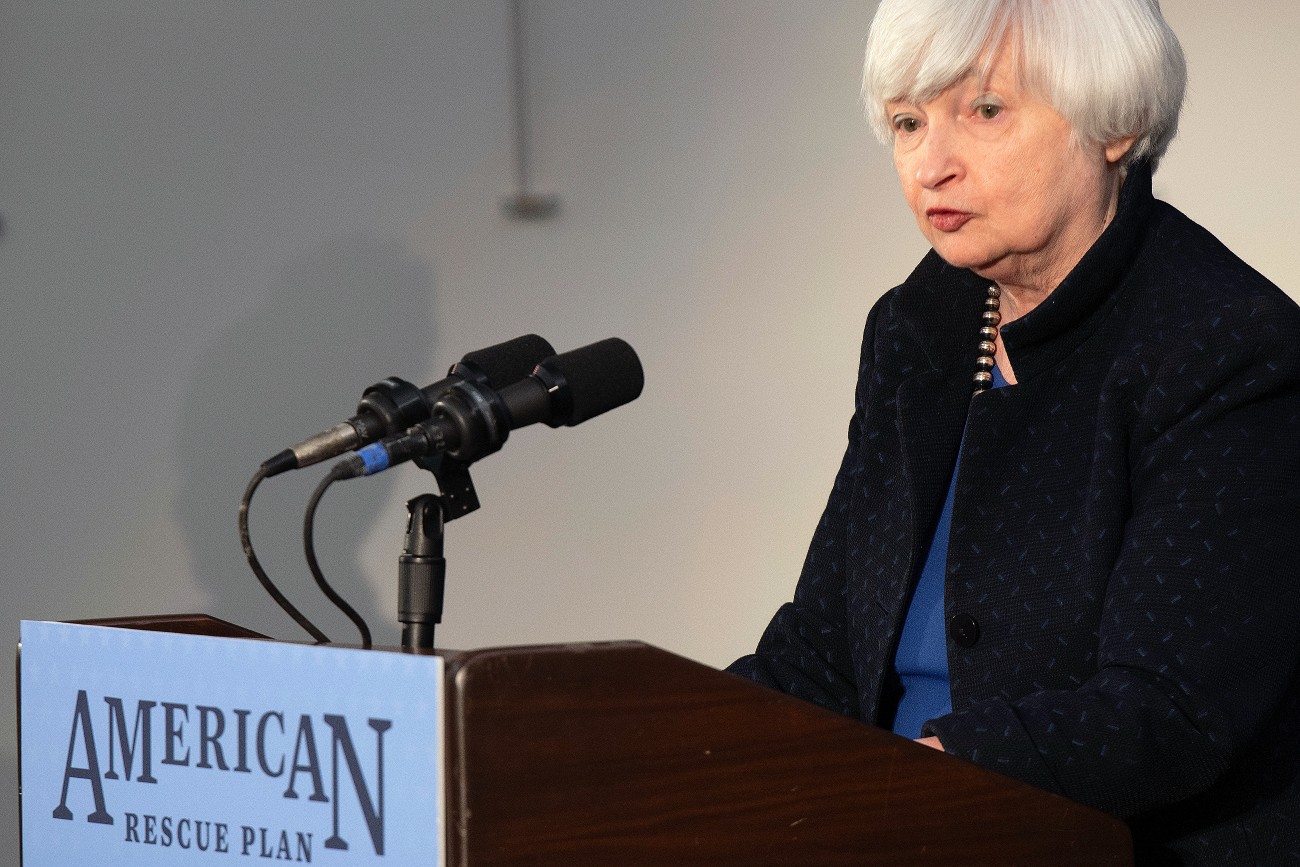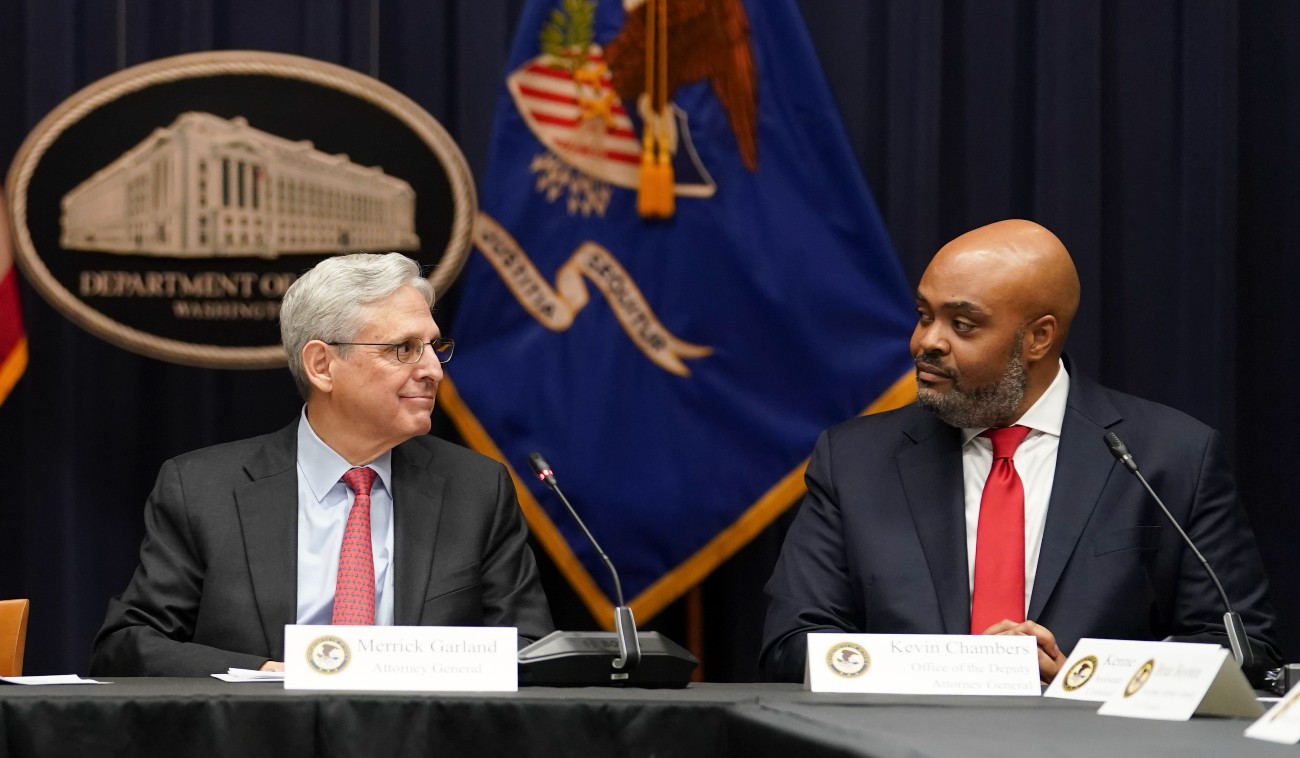
JIM WATSON /Getty Images
Two Years of COVID-19 Oversight: A Look Back
The CARES Act of 2020 created three pandemic-related oversight entities, and our series will examine their successes and failures as well as their challenges and goals moving forward.
Lamborghinis. Pokémon card. Vacations. Those are some of the many things individuals were charged for spending fraudulently obtained coronavirus funds on. There has also been widespread identity theft, which federal watchdogs have been scrutinizing over the last two years, not to mention how federal agencies themselves managed and distributed an unprecedented amount of money for the pandemic and the resulting recession.
Lawmakers foresaw the risk of widespread fraud in passing the CARES Act, which President Trump signed into law on March 27, 2020, and established three oversight entities, which are now overseeing trillions of dollars between six relief packages:
- The Pandemic Response Accountability Committee coordinates and supports oversight of more than $5 trillion in pandemic relief programs and spending
- The Congressional Oversight Commission oversees how the Treasury Department and Federal Reserve used specific taxpayer funds from the CARES Act to stabilize the economy as a result of the pandemic-induced recession
- The Special Inspector General for Pandemic Recovery scrutinizes how the Treasury Department spends certain loans and investments from the CARES Act
This week, Government Executive will look at the successes and failures as well as the challenges these entities faced over the past two years, working alongside law enforcement partners and other oversight bodies, and their goals for the future.
Oversight under President Trump
These new oversight bodies were not entirely well received by the sitting president, as Trump questioned the need for the new inspector general in a signing statement accompanying the CARES Act. During a briefing four days before signing the bill into law, Trump announced that he would “be the oversight” when asked about a $500 billion corporate rescue fund as congressional members debated the package.
The Trump administration had a mixed record on oversight throughout its four years and many objected to its handling of the pandemic. Nevertheless, Russell Vought, then acting director of the Office of Management and Budget, reassured lawmakers during his confirmation hearing in June 2020 that the agency was “providing guidance based on the statute as written on how agencies should allocate [funds] and the kinds of considerations they should think through and also be a cheerleader for transparency and oversight,” adding that “IGs have the money that Congress has appropriated for them to be able to find the actual issues of concern.”
Transition to the Biden Administration
In March 2021, just shy of two months in office, President Biden stressed the need for oversight and accountability of coronavirus funds while announcing that Gene Sperling would be heading implementation of the American Rescue Plan. While not mentioning Trump by name he took a few shots at “the previous administration.”
“[The Biden administration] is focused on timely relief, to the intended beneficiaries while strengthening [the] government's ability to act as a trustworthy steward of taxpayer funds. The administration’s collaboration with the oversight community has proven essential,” Jason Miller, OMB’s deputy director for management, said in his prepared opening statement for a Senate hearing last month. “Through [American Resource Plan] implementation we have focused on getting it right at the front end working towards prevention to mitigate risk,” such as through new “Gold Standard Meetings” in which OMB and the White House American Rescue Plan implementation team meet with agency officials, IGs and Pandemic Response Accountability Committee leadership “to jointly review new or significantly expanded [American Rescue Plan] programs before launch.”
Miller also highlighted guidance the administration issued after the American Rescue Plan was passed that balances “transparency, accountability, recipient burden, and program flexibility in order to facilitate appropriate program-level reporting,” and guidance released in December 2021 encouraging agencies to increase collaborations with their IGs.
Biden – who oversaw implementation of the Recovery Act in 2009 when he was vice president – said during his State of the Union last month that “the watchdogs are back,” particularly regarding coronavirus oversight.
“The previous administration’s approach to oversight is a record we needed to fix and address,” a senior administration official on background told Government Executive.

What the Experts are Saying
Sean Moulton, a senior policy analyst at the Project on Government Oversight, told Government Executive that he believes all three entities were needed and “I think it was a good approach.” In implementation of the Infrastructure Investment and Jobs Act, which was enacted in November 2021, “we're seeing some echoes” of the oversight efforts from pandemic relief packages.
Moulton said the Pandemic Response Accountability Committee is where things worked best because of the broad authorities it has and collaboration among agency IGs. This was despite them early on being “limited by some really bad decisions that were out of their control,” such as Trump ousting Glenn Fine from the Defense Department’s acting IG position, thus stripping him of the ability to lead the committee, and guidance from OMB that “ignored” reporting requirements on spending from the CARES Act.
“Retroactive reporting is a real challenge and that’s why you need to get it right the first time,” according to the senior administration official. The administration tried to course correct with future guidance and other efforts. The official also noted that Michael Horowitz, chair of the Pandemic Response Accountability Committee, complimented the guidance during a Senate hearing last month.
The Congressional Oversight Commission was “very limited in its effectiveness” because it never had a chair and now is down to only two members, both of which are from the Republican party, Moulton of POGO said. As for the Special Inspector General for Pandemic Recovery, he said its jurisdiction should not have been as limited after a legal opinion from the Justice Department in April 2021 narrowed its scope, something Special IG Miller contested.
“I think Congress should have made it clear, so it wasn’t really up for this kind of evaluation or interpretation,” Moulton said.
During the State of the Union on March 1, Biden said “the watchdogs are back” and announced a new special Justice Department prosecutor for COVID-19 fraud would be named soon. Before the speech, the White House announced that a pending executive order would be aimed at preventing and detecting identity theft in public benefits programs as well as aid victims of such.
Equity in the COVID-19 relief programs is another issue, as there isn’t sufficient information collection, but the watchdogs can’t be blamed if the correct systems are not in place, Moulton said.
“I think that these oversight bodies are probably doing the best they can under very challenging circumstances,” Nan Swift, resident fellow for the governance program at the R Street Institute, told Government Executive, pointing to funding, leadership, definitions of what their roles are and setting up their operations very quickly for such an unprecedented amount of money.
Time will tell how effective they were, if some were more effective than others and if all three were needed, she said.
“[Each] day, almost, there's a new report of fraud or waste across many many different programs and does that mean that we didn’t do a good job of creating the kind of guardrails that would prevent this or does it mean that these bodies are doing a great job at catching it all?” she asked. “I think that’s too hard to discern at this point.”
Swift added that an issue was the Special Inspector General for Pandemic Recovery did not have a well-defined role. The office’s jurisdiction was narrowed last spring following an opinion from the Justice Department’s Office of Legal Counsel, which Miller said at the time would impede oversight of trillions of dollars in coronavirus relief programs. Based on her reading of the statue Swift believes that he had a “narrow jurisdiction that applied to just the bigger Fed and Treasury programs that were in the section where the office was established, so I’m not sure whether it was maybe incorrect expectations either on the part of that office or the others that have led to this confusion? That’s something that shouldn’t have happened,” nor should he have had to worry about funding, as was the case earlier this year.
As for Biden’s “watchdogs are back” comment, Swift said actions will speak louder than words.
“We’ll have to see if that happens during the next two years that we have left on most of these programs,” she said.

The Justice Department’s Work
The Justice Department said last month that “the unprecedented pace and tempo” of COVID-19 enforcement cases was only possible through the collaboration of its various components, law enforcement partners, inspectors general offices, Pandemic Response Accountability Committee and others.
In that same announcement, the department announced that Associate Deputy Attorney General Kevin Chambers would serve as the director for COVID-19 fraud enforcement, which builds on the DOJ’s previous efforts which led to “criminal charges against over 1,000 defendants with alleged losses exceeding $1.1 billion; the seizure of over $1 billion in Economic Injury Disaster Loan proceeds; and over 240 civil investigations into more than 1,800 individuals and entities for alleged misconduct in connection with pandemic relief loans totaling more than $6 billion.”
William Barr, attorney general under the Trump administration, wrote about those wins in his new book: “I am proud of the department’s efforts against COVID-19 related fraud. A year after I launched it, my successor Attorney General Merrick Garland, praised the DOJ’s work as a ‘historic enforcement initiative.’”







